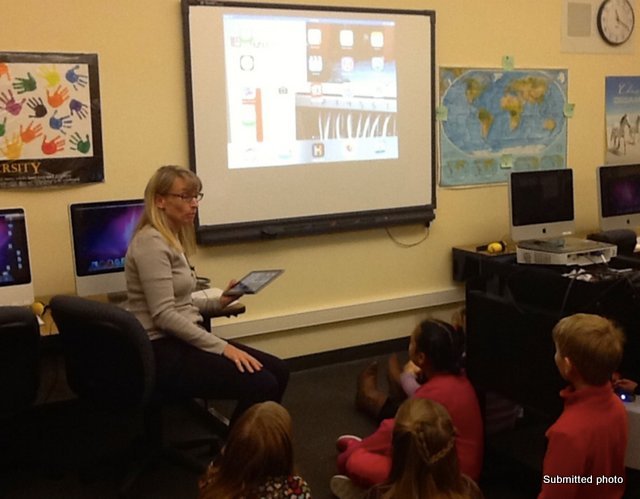Fun, Learning Combine on Computers at Williamstown ElementaryBy Stephen Dravis, Williamstown Correspondent
10:17AM / Monday, January 13, 2014 | |
 School Technology Director Tom Welch told the School Committee last week that the first year of the project was a hit with pupils and teachers. School Technology Director Tom Welch told the School Committee last week that the first year of the project was a hit with pupils and teachers. |
 Williamstown Elementary is participating in a technology initiative that has been incorporated into the curriculum. Williamstown Elementary is participating in a technology initiative that has been incorporated into the curriculum. |
WILLIAMSTOWN, Mass. — Using computers to learn is good.
Learning how computers work is even better.
Children at Williamstown Elementary School recently participated in the Hour of Code initiative sponsored by the non-profit Code.org.
School Technology Director Tom Welch told the School Committee last week that the first year of the project was a hit with pupils and teachers.
"It's a way to get the students to control the computers versus being controlled by them," Welch told the committee at its monthly meeting.
"[Hour of Code] is an online program that encourages teachers in K-through-8 to get students to think about computer science as a field. Apparently there are a lot more jobs than there are computer scientists. And it's also the wave of the future."
School Superintendent Rose Ellis said the Hour of Code was also incorporated into the curricula at Mount Greylock Regional School and Lanesborough Elementary.
"The tech coordinators at the three schools worked together," Ellis said. "We want to move students away from being consumers of technology to being producers."
Third-graders at WES worked with Hopscotch, a "coding for kids" app available free for iPads. Children in Grades 4 through 6 worked with Welch on a Code.org programming tutorial tied to the popular Angry Birds app and Scratch, an Massachusetts Institute of Technology initiative that lets children program interactive stories, games and animations.
"They were very engaged — sixth-graders down to third-graders," Welch said.
Every parent knows computer games keep kids engaged. But they also can be used to engage pupils on a deeper level and teach them about what makes the game run.
Parent Matthew Baya, an information technology specialist at Williams College, wrote a grant for Minecraft that came from the Williamstown Elementary School Endowment Fund. He and Welch are trying to start a Minecraft Club at the school. Minecraft is an open-ended game that relies heavily on user-generated content.
"There are lots of things you can do with Minecraft," Welch said. "That's new and exciting. [The children] are already doing it, and we're trying to keep up with them."
To keep the teachers — barely — ahead of the children, WES acquired 30 iPads to help boost productivity in the classroom.
"A teacher can be in circle time doing attendance on the iPad without having to get up and go to the [desktop] computer," Welch said.
"The next [training] sessions are going to focus on what we can do in classrooms that's not just different but better than what we can do without [the devices]. That's a continuing conversation, but it's very promising."
Welch said the technology discussion at WES includes conversations about how kids use the Internet in their daily lives, not just in school.
"I was in the third grade two days ago, and the first question was, 'Who's familiar with the iPad or the iPhone, and every hand went up," Welch said.
All that gadgetry at a young age opens doors, and not all those doors are good. Welch said the program at WES emphasizes good digital citizenship.
"There was a thing on Yahoo News recently talking about apps parents should know about: Snapchat and things like that," he said. "Kids can do things online that parents don't know about.
"When things come up, we talk about them as lessons. We don't just talk to the person [involved], but we generalize it — anything from what is your screen name to how does this [activity] look to the outside."
Of course, the school still uses computers in the "conventional" way, as conduits to educational learn-to-read and mathematics programs. The field continues to grow, and WES students benefit from having access at home to web-based programs like Lexia [English] and IXL [math], which also allow teachers to monitor an individual child's activity and progress.
The school's budget benefits from web-based programs, too, Welch noted.
"The software budget has gone down over the last few years because there are so many free things and so many things available over the cloud," he said. "We don't spend a whole lot on software."
The flipside is that if everyone is using online programs, the school's wireless capabilities are in danger of being maxed out.
Welch said the system has enough capacity right now, but he is constantly looking at ways to upgrade the network.
"It's not an emergency now, but it's getting to be time where we think about it seriously," he said.
Updated at 12:33 p.m., Jan. 13, to note Matthew Baya's involvement.
| 
 MEMBER SIGN IN
MEMBER SIGN IN
 MEMBER SIGN IN
MEMBER SIGN IN